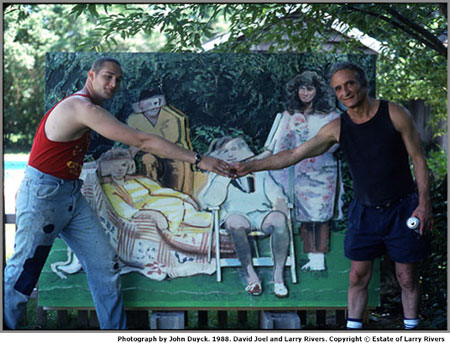

Larry Rivers was a multi-talented, charismatic man of great complexity and vision. In the absence of his prodigious energy, those of us who were working in his immediate circle, found ourselves deeply immersed in a necessary restructuring and organizational effort. Our first few years without his direct guidance has been like a return to school, mixed with challenges and discovery, driven by boundless potentials that continue to evolve daily.
Supported by the confidence of our board of directors, the Larry Rivers Foundation remains committed to the aesthetic of a man whose Socratic sense of inquiry produced seminal moments in art history. With his over 50 year involvement in the arts Larry Rivers created and cultivated an expansive archive of material that represents every aspect of his many varying interests.
Larry was a Jazz saxophonist before he became the famous artist. He continued to play, write, arrange and record music throughout his entire life. He also wrote poetry, essays and editorials. He documented numerous interviews, projects, movies and events that together constitute well over 500 hours of film and video. He acted in movies and plays, created costumes and set designs for various productions. He created and cultivated a written archive of letters and transcripts that to date exceeds 15,000 pages, but we’re still reading and counting and there’s a lot more to go. He traveled the world, was a TV personality, an MC at nightclubs, a popular personality on the lecture circuit, a father, a grandfather, a teacher and a friend, and somehow between all of this, he not only made well over 3500 original works of art but as the famous art historian and critic Henry Geldzahler said, he managed to “change the way a whole generation of artists thought about what is allowable subject matter.” I’m confident to say that Pop Art would not have developed as it did without Larry Rivers.
As I continue to read through the many letters, manuscripts and essays from the late 1940’s to 2002, my confidence increases exponentially. In a revealing letter to Frank O’Hara dated July 1953, (the letter is highlighted on our seminal page slide show) Larry, overtly and at times with great subtlety approaches the motivation behind his sense of opposition.
The letter begins, “Dear undergraduate; The destruction of reasoning is dependant on a superior system of thinking in that it shows the fallacy of what has been thought.” A bit further down Larry continues, “… my sense of diversity in men leads me to think it’s a matter of personality. Another year and no one will want to be near me for fifteen minutes. This might influence some people. I suppose I’ll try to cut it down to ten minutes…” And finally towards the end of the letter he addresses the work. “Soon Birdie a portrait of a lady will vanish and I can’t wait to start the most controversial painting of our time…” He then seems to “X” out the words Washington Crossing the Delaware and continues, “… (I just changed my mind) I thought Washington Crossing the Delaware, but maybe something a little more obscure like him Crossing the Potomac or Washington at his toilette I’m not sure.” Of course he soon became quite sure and the rest as they say is history, in this case a bold and brilliant moment in art history.
Larry consciously chose his personality; he knew that he could alienate people. He knew the risk he took by creating controversy. He knew that people may not want to be near him for more than “fifteen minutes.” But he valued the influence of this alchemy; his art and attitude. He recognized, without humility, (which ironically helped to affirm the conviction of his personality) that “fifteen minutes” with him might just be enough time to influence anyone to run in any direction, with new ideas and inspired goals.
Larry lived his life to the fullest; influencing so many ideas and so many people with his much more than “fifteen minutes of fame.” He reveled in the notion that where there is room to shock and surprise, there is room for growth and education. He was always ahead of his time; waiting for people to catch up and recognize that change doesn’t come from complacency and comfort, but instead, is born out of the chemistry of confrontation and inquiry. He understood that “the destruction of reasoning is dependant on a superior system of thinking in that it shows the fallacy of what has been thought.”
As the director for the Larry Rivers foundation, I encourage everyone to consider Larry Rivers’ unique contributions; ask questions and don’t fear the possibility that the answers may contribute to “a superior system of thinking.”
Thank you for your interest in Larry Rivers.
David Joel
Executive Director









